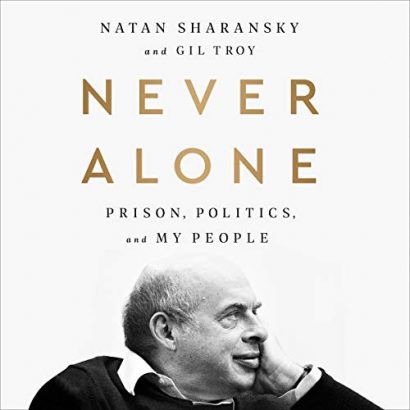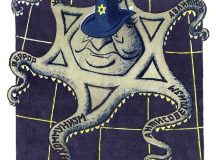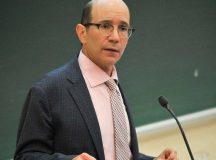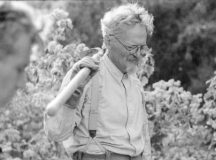Fathom Deputy Editor Samuel Nurding spoke with Natan Sharansky and Gil Troy about Never Alone: Prison, Politics, and My People. The book tells the life story of Sharansky and sets out the evolution of his perspective on the relationship between the state of Israel and the Jewish people from shifting vantage points: Soviet dissident to Israeli politician to the head of the Jewish Agency.
Samuel Nurding: Natan, Gil, how did your collaboration come about?
Natan Sharansky: I was finishing my nine years at the Jewish Agency and I thought it would be an interesting to look at relations between the Jewish world and Israel from the perspective of three different times of my life. I was not thinking about the book as a memoir but rather as a way to continue the dialogue that I been trying to conduct my whole life. I met Gil through projects of the Jewish Agency. He has also been long-concerned with many of the issues I wanted to explore in the book.
Gil Troy: I was finishing up my book, The Zionist Ideas, and met Natan in his office hoping that he would write a preface. Natan thought he was meeting me to solicit my help in writing his next book! The Zionist Ideas had taken a lot out of me and I thought I needed a year or so to get away from writing, but when Natan Sharansky gives you the opportunity to work with him, you don’t say no!
The goal of our book is to explore the idea of a ‘Jewish parlance’ – a way of lessening, not eliminating, some of the tensions in Jewish society by giving people a voice. It was Natan’s old comrade from Moscow, the founder of PublicAffairs Books, Peter Osnos, who really pushed us to put Natan’s story front and centre of the book. Neither of us wanted to write a memoir, so I created this word, memoir-festo, to explain how the book tries to use stories from Natan’s life to explore some broader ideas that unite both of us in a very profound and surprising way. I say surprising because I am a child of freedom, from the big cosmopolitan city of New York while Natan is a child of the mass slavery of the Soviet Union. Yet when we finally met here in Jerusalem, we found we agreed on so much.
Doublethink and the Soviet Years
SN: Natan, what was life like growing up in the Soviet Union in the 1950s and 1960s?
NS: There were two things absent in my childhood: Jewishness (identity) and freedom. Coming from a second-generation Soviet Jewish family there were no Jewish books or places to buy them, no Hebrew or opportunity to study it, and we knew nothing about the Jewish holidays. But there was one Jewish thing: antisemitism. Jews learnt how to survive, often by becoming the best in your respective field of work. We lived without freedom because there were certain things or thoughts that Jewish people knew they were not allowed to say publicly: you could not criticise the regime or state institutions, and to fight it was not an option because we were too occupied with trying to survive.
1967 was a turning point for me and for many other Jews in the Soviet Union. The Israeli victory in the Six-Day War made a lot of us connect to our Jewish identity and we started talking openly about what had happened in that war. I began reading a lot of books about the Jewish people, and about the past and about modern Israel.
I soon realised that if you make a switch in your mind, this unique history of the Jewish people can also be your history – that you do not have to start your history from 1917 and all the awful events which happened after this date, but from the Egyptian exodus and even earlier. When you discover a different history, and realise that other people also want to be part of it, suddenly you have ideas which are bigger than your own physical survival. This is what gives you the strength to start speaking your mind. The moment you call a halt to this life of doublethink – in which you say things in public you don’t really believe – it’s a massive relief and it reinforces your determination to fight for your rights, and for the rights of other Jews. Eventually, I went from being a doublethinker to a dissident.
SN: Once you made that leap did you realise it was inevitable that you would end up in a Soviet prison?
NS: Of course, when you start that transition you hope to avoid going to prison but you also understand that it can finish very badly for you. The feeling of liberation, of enjoying your newly discovered sense of freedom, is so powerful that it becomes very hard to stop going down the path you’re on, even if you know where it might lead.
I got used to being searched, being followed by the KGB, and having the telephone line disrupted. I became an informal spokesperson for the movement, communicating with many Jewish organisations that wanted to help us. With every step I took on that path the dangers grew and the KBG became more aggressive. Simultaneously I became more resilient. I was empowered by working for the Jewish people. If I knew in 1968 that I would finish my life in the Soviet Union in 1977 then of course it would probably have influenced me, but by 1974 it would not have stopped me.
GT: Natan is too modest. The threat of imprisonment stopped many people from taking a public stand. One of the things that surprised me most when we were writing the book was realising that the Refusenik movement, which I had thought was made up of tens of thousands of people, was at no point able to get over 150 people to sign a petition. That is simply mind-blowing. It says that about 150 people had crossed that line from doublethink to dissident, whilst thousands more only tried to get approval to emigrate. But more than that, it really shows how a very small group of human beings fighting for freedom can make a huge impact. From the perspective of the US, the Soviet Union was formidable and would last a very long time; but from within, this small group made history.
Life in Israel, life in Politics
SN: In 1986, after nine years of prison life you were suddenly released and you touched down in Israel a few days later. How did you cope with that turnabout?
NS: I was taken from hell and thrown into paradise in the space of a few hours, celebrating my release with the Jewish people outside the Kotel. It had been 12 years since I had seen my wife, and our challenge was how to life our lives together again. It was not easy to put a big wall between our public and private lives. After all, the Jews of Israel and Jews of the world had fought for my release and they all wanted to be with me.
Although I was the first political prisoner to be released under President Gorbachev, I knew I had to keep struggling for all the Jews still left in the Soviet Union, which I did during the first years after my release. During those early years there was a big desire in the free world to embrace Gorbachev and ease the pressure on him. It took at least three years of day-to-day struggle until the Iron Curtain was torn down and all the political prisoners and Jews were free.
SN: What made you decide to enter Israeli politics?
NS: I didn’t want to go into politics. After leaving prison I had this feeling of connection to everyone and I knew that politics, inevitably, would mean that my loyalty would be not to the Jewish people but to a political party and its goals. However, after spending so many years trying to bring down the dictatorship and enable the mass exodus of the Jews to Israel, I felt myself responsible for helping them to integrate into Israeli society, and to rebuild their lives. At the time nearly 20 per cent of the population had just arrived in Israel and most of them could not speak Hebrew. The challenges of integration were huge. I realised that to best serve the new immigrants I needed to give them a voice and the opportunity to use the skills they had developed in the Soviet Union for the State of Israel. And to do that, a political party was required to pass new laws, move government budgets and enact new social programmes.
When forming the new party, I said our aim was to make ourselves irrelevant in a few years. I was heavily criticised by my colleagues for saying that. But this is more or less what eventually happened. Perhaps not in all levels of the Knesset, but certainly in the municipal elections, many mayors and deputy mayors emerged from the ranks of the Soviet immigrants.
GT: After Natan got out of prison in 1986, at 38 years of age, he flips from being the ultimate stubborn outsider to becoming an insider and a compromiser in Israel. And whilst he managed the flow from outsider to insider very effectively, the compromising part was very difficult for him and that’s why he became very good at quitting Israeli governments.
SN: Natan, you write in the book that you thought you were a bad politician. Was that why?
NS: Look, we did need to make compromises, like every Israeli political party does. But when it was clear to me that supporting the government contradicted my core beliefs, and sometimes even my superior knowledge of the subject, I felt it could not stay in the government. There were two cases when this happened. The first time it was a very difficult decision to make because my party Yisrael Beiteinu was made up of immigrants from across the political spectrum, and because the party needed to be in the government to drive change. The second time I left the government, over the disengagement from Gaza, and that was an easier decision. By then we were part of the Likud. Although Ariel Sharon was an ally on many other issues, I knew that he was leading Israel toward disaster. When Netanyahu returned to power he asked me if I would return to politics, but I felt that after being in four different governments and resigning from two of them, it was better for me to head over to the Jewish Agency. He was very surprised I chose this path, which is usually a step toward politics, not away, but I thought it was natural for me because it dealt with the topics that I was interested in and I did not have to worry about political compromise.
A dissident’s view of peace
Building a Palestinian civic society
SN: You write, ‘I felt alone when it came to Palestinian issue’. You were against Oslo, Camp David, and the Gaza disengagement. Can you talk about what you think is the best path to peace? And why do you think you have been a lonely voice?
NS: I have to say that when people hear my record on the Palestinian issue they automatically decide that I am a far-Right politician because I was against Oslo from the very beginning, as well as Camp David and Gaza disengagement. But if you look at my arguments, I do not know anyone on the Right who is willing to accept my way of thinking on how to bring about peace. I was for two-states in the late 1980s, long before it became mainstream. And I believe that the only way Palestinians will be responsible for their own lives and will not become a danger to our existence is if they develop a civil society – or, in other words, if the leaders of the Palestinians focus more on building their people and not on destroying us.
When Oslo was signed and everybody said it was the start of the peace process, I wrote a critical piece about the agreement because I could see that it meant that we were recognising Yasser Arafat as the Palestinian leader, despite him being a dictator. I said he would become our dictator. I predicted that we would give him a lot of international legitimacy and money but because he was a dictator he would need an external enemy in order to control his people – i.e. us. And that the next generation of Palestinians would hate us even more. I was told at the time that my way of thinking was naïve, or as Arik Sharon put it to me: ‘This is relevant for the dungeons of the KGB, but not for the Middle East.’
This profound connection between civil society and real peace was missed. To this day many people do not understand what a disaster Oslo was. It ended the natural and necessary process of bottom-up peacebuilding. Israelis have to realise that if we want peace, it can either be built on the basis of our army and therefore we cannot allow the Palestinians to have an army or enough territory, or peace can be built from the bottom-up, with civil institutions, joint economic and social interests, etc. Yitzhak Rabin told me in 1993 that what I was thinking was for 20 or 30 years in the future, and he was talking peace in the next year or two. It’s nearly 30 years after Oslo and we are more distant from peace with the Palestinians, so I think I was right, unfortunately.
GT: These are both arresting counter-cultural moments. First, we have the great human rights activist responding to Oslo with a warning: ‘Wait a minute, everybody is talking peace, but it’s a peace of the dictators, which will only be a fake peace’. Whilst he was vindicated, he took no joy in that, because the vindication came in the form of terrorist attacks. Second, during the worst days of the Second Intifada, when everyone who cared about the Jewish people was in uproar about the Palestinians, Natan, this ‘right-wing’ minister, wrote in the Wall Street Journal that what the Palestinians need is democracy, factories, and human dignity.
Both these interventions disturbed the dominant culture of the peace process. Natan’s correct when he says that he was a party of one on the Palestinian issue. Perhaps it helped that he came from a different world than we Israelis who have a hopeful way of thinking that sometimes blinds us to realities. In the book I had to be more modest as I was talking in Natan’s voice but now I can be more open, especially because many people are still singing from the Oslo hymn sheet.
SN: Does Israel have a role in helping the Palestinians back onto the path to building a liberal democratic civil society? Can it be done under Abbas?
NS: I think all the free world has a role, including Israel. People say, ‘You can’t just export democracy’ Of course we cannot impose democracy, but we have to understand who our real allies are. In the Palestinian case, opposition voices to the current leadership are our allies. I’ll give you an example: a friend of mine is trying to start a new project on providing lessons about democracy to schools in the West Bank and needed some money, of which I am trying to help. When he approached the EU for extra funding, a modest amount, they asked about his relation to Abu Mazen [Mahmoud Abbas]. When it transpired that my friend is a critic of the current leadership, the EU said it could not fund the project, but only those supported by the PA. This is very counter-productive to civil society building.
The West has to identity its real allies – and that can be a slow process. Arafat was not interested in any projects that made Palestinians more independent of him. The problem today is much greater. By the way, the Marshall Plan I proposed for the Palestinians back in government was reincarnated in the Trump Plan this year.
Peace with Dictators
SN: What do you think of the Israeli-UAE agreement? Is that not an example of making peace with a non-democracy?
NS: The UAE is not an example of the democracy that I hope the Palestinians achieve. I have been very critical of the American support for the Gulf states. They all say that Saudi Arabia and co. support building democracy and stability in the region. I have never said that we should never not work with dictators – Winston Churchill got close to Josef Stalin to defeat Nazi Germany. But, you have to make sure you do not strengthen dictators against the free world and against their own people.
What is positive about the recent peace treaty is two things. First, it’s not about imposing peace but about normalising relations. There is a real focus on people-to-people links and joint ventures. We are not giving the Al-Nahyan family more tools to suppress the freedoms of their own people. Second, the agreement nullifies the paradigm of the Palestinian terrorist leaders, that says Islamic terrorism and ‘West vs Muslim’ tensions will never stop until there is a resolution of the Palestinian issue. Because of this paradigm, Arafat and others used to say that they didn’t need to compromise with Israel to make peace, they just needed to mobilise the Muslim people to pressure the Western world into forcing Israel to compromise. I hope – we don’t know yet – that there can be normalisation between Israel and the Muslim world and that this helps the peace process with the Palestinians.
GT: We have a beautiful experiment here. One group, the Emirates, started to develop closer ties with Israel. Now, by calling it a peace treaty, we are able to build up this network of business links, people-to-people and cultural projects, and aim for a real peace. On the other hand, another group of states, led by the Palestinian leadership, prefers ‘anti-normalisation.’ They try to eviscerate people who are open to building peace, building bridges. The anti-normalisers might get their symbolic victories in the UN, or on elite campuses, but they never get close to building a real peace.
It is strange how few people have managed to look soberly at events over the last couple of months and realise that, if they’re in favour of peace, the baton has shifted to those people who are normalising and building bridges. I agree with Natan that the Arab Gulf leaders aren’t exactly democratic leaders, but they have at least added a little bit to the peace side of the ledger. The Palestinian leadership have tried to take away from that side of the ledger by supporting de-legitimisation and boycotts.
NS: I want to add something else. We had very important peace agreements with Egypt and Jordan yet the level of hatred between Muslims and Jews in Egypt never diminished. In 2000 Egypt was still the publishing centre of all Arab antisemitic literature. And anyone in Egypt who wants to have more open and peaceful dialogue with us is immediately prosecuted by their own society. I have built very close connections with democratic dissenters from Egyptian society and they always tell me how difficult it is to show any sympathy toward Israel. Now, after this treaty, everyone from the person on the street in the UAE to the country’s leadership is speaking openly about how they want warm relations with us. We’ve still not got this with Egypt even more than 40 years after the peace agreement. Normalising relations people-to-people and business-to-business is more meaningful than imposing a cold peace from above that has no substance.
Sharansky and Netanyahu
SN: Netanyahu appears early on in the book when he helps your wife Avital in her struggle to free you from prison. And he has been an important figure for you throughout your life in Israel, clearly. How would you describe your relationship?
NS: Bibi is a very dear friend. And this friendship began when I was in prison. He became a very important strategic advisor for Avital, often ignoring official recommendations from the State of Israel. I have seen, from inside and outside government, how pivotal was Bibi’s role in transforming Israel from a socialist and non-competitive state to a free-market society and Start-Up nation. Yes, many, many people contributed to this development, but Bibi was so committed to it, ideologically, that he drove it, despite all the counter pressures from within.
Another example of Bibi’s importance is Iran. Over 20 years ago he realised that his leadership was going to be vital if we were to meet the Iranian challenge. Many people fail to grasp that he has, sometimes single-handedly, orchestrated what is now the mainstream policy against Iran. Having said that, I was also extremely disappointed with the Kotel crisis when he initiated a very important dialogue but then betrayed it because he was afraid of its potential impact on his coalition. There is no doubt he is a very clever politician and master at building coalitions but it has come at a big price, sometimes with bad decisions and sometimes with demonising your opponents and causing civil strife to win elections.
SN: You refer to a reporter from the Jerusalem Report who titled an article about you, written after Rabin’s death, ‘Mr Ten Percent’. You said he was ‘blinded by Bibi hatred.’ Do you think there has always been an element of Bibi-hatred in the press. When did it emerge and why?
NS: What I saw back then were ideological disagreements with Bibi. Today, the ideological discord has turned personal, and has been extended to his family. After Rabin was killed and Netanyahu came to power in 1996 some people, including some of my closest friends, started saying that peace had been ‘stolen from them’. I think that was absolutely wrong. Bibi inherited the Oslo Accords which he was obliged to continue. But they could never have brought the peace that many people had hoped for.
GT: Since 1977 and the famous Begin victory, there has always been a sense that the Right has ‘stolen’ Israel. In the US today, and in the UK too, there is often a similar feeling on the Left that when the Right is elected democratically, or wins a referendum, this is in some way illegitimate. Having said that, just because the Left and some newspapers are hostile to Bibi, that doesn’t mean that he’s always right. He all too often uses that hostility as a screen behind which he can dodge responsibilities for some of his actions.
Israel, the US and the Diaspora
SN: A big question to end. What are the main challenges to the relationship between Israel and the Jewish World and how can they be best met?
NS: Half of the Jews in the world have decided to live in Israel in the Middle East and their number one priority is guaranteeing the physical survival of Israel and keeping it democratic. The other half have chosen to live as a minority in Western society and in order to survive and thrive they need their societies to remain liberal and open, without basic freedoms being undermined.
In theory, these two populations should be able to coexist. The problems arise when one side believes that because the other side doesn’t regard its needs as a top priority, it is betraying Jewish values and Jewish interests. We can see that many American Jews lack the understanding of the most basic security needs of Israel. On the other hand, we can see how many Israelis do not understand that Jewish pluralism is a necessary component of Jewish survival as a minority in the US. You cannot change each side’s set of priorities, but you can use the fact that both sides continue to want to be a part of the Jewish fabric – like two brothers who have chosen very different careers but remain family. In order to remain ‘brothers’, though, each has to be willing to dialogue with their sibling, to listen and to talk.
GT: This polarisation is preventing people from listening to one another. It’s a similar problem with antisemitism. Our friends from the Left only see right-wing antisemitism while our friends from the Right only see left-wing antisemitism. We are making a plea: let’s understand we have a common cause, just as the Jews in the Soviet Union did. Yes, they also had many disagreements but they focused on a common goal and united to achieve it.
The book rejects easy ‘either / or’ choices. We refuse to say, ‘oh, just go for liberalism, freedom and openness’ or ‘Oh, just go for identity and particularism.’ It’s all about finding a balance. Too many people are escaping into simplifications. Too many are attracted to the promise of purity at the extreme. We are inviting people into something better, a richer conversation about the future of Israel and the Jewish people.




































